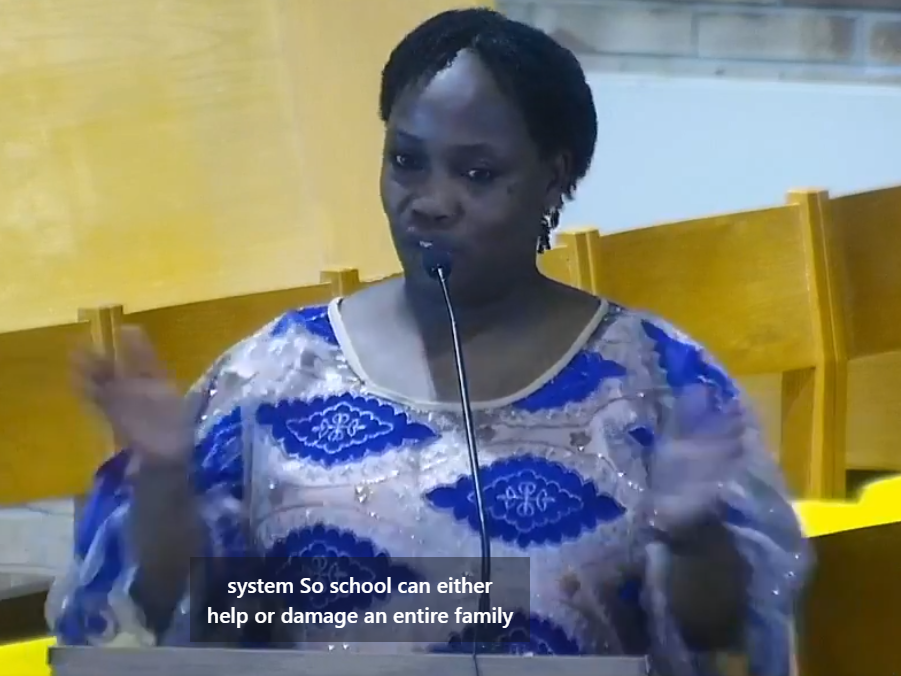Rev. Chris Jorgensen & Dr. Betty Kola
February 20, 2022
Video of entire service: https://www.facebook.com/hanscomparkchurch/videos/925710244808749
Scripture: Mark 5:1-20

The day is finally here. Guess what part of the scripture we are talking about today?! That’s right. The Legion and the pigs. Just like I’ve been promising you.
So, in the scripture, we hear about this man who is suffering and outcast because of what is described in the text as demons. Now, we’ve been talking these last couple of weeks that the man could have been experiencing a kind of mental illness. Of course, the gospel writer would not have had that framework of understanding in his ancient culture. But even if we are not sure this was a mental illness, we can see how it could be an analogy. The man’s situation is like a mental illness in that there is emotional distress, agitation, self-harm, and isolation from the community.
Now about this Legion and the pigs… You heard in the scripture that Jesus asks the demon its name. And the man replies, “My name is Legion; for we are many.”
When you and I hear this name Legion, we might catch some of its meaning. In English, of course, a legion is a whole lot of folks. And we might think, “oh dang! That means there’s a whole bunch of demons in him!”
But the associations with that word in ancient Judea (where Jesus lived) were much more pointed. One commentary on this story says that this scripture “contains a veiled reference to the devastation of people and property caused by the Roman occupation [of Judea].” It goes on to say, “The Tenth Legion, which used the BOAR as a symbol on its standard, had been stationed” [in that very area]. [1]
In other words…there was a Legion of Roman soldiers that used a wild pig as its symbol stationed in the area where this story is set. As we heard, the multitude of demons in our scripture actually identify themselves as “Legion,” and then they die when they are cast out into pigs who run into the sea. And the commentators are saying this a “veiled” reference to the Roman occupation? It seems sort of obvious to me!
When we focus on this detail, we see that the Gerasene man was not just suffering because of something inside of him. His suffering wasn’t simply a chemical imbalance or a result of a personal tragedy. Those things may have been happening, but he was also…maybe even primarily (given the legion and the pigs)…suffering because of something that came from outside of him. He was suffering because of the oppression of the Roman Empire.
This empire was known for a number of things. They were the ones who used violence as a means to create “peace.” The so-called “Pax Romana.” They had this way of keeping order by conspiring with the locals. They recruited collaborators. The wealthier residents of Judea helped them to subdue and exploit the poorer residents. They had no tolerance at all for dissent. Their enemies were destroyed, killed, ousted, or at the very least disregarded or silenced.
And this was the very empire that crucified Jesus because he was a challenge to everything the Empire stood for. Jesus’ teaching of love of one’s enemies and peace and prosperity for the most vulnerable was an affront to the Empire’s values.
So this story is not just of a Gerasene man who was suffering because of something that was wrong with him. The fact of the matter was that the oppressive, ruthless, violent, occupying Roman Empire was keeping him out of his right mind. Jesus showed the Empire what he thought of it when he sent those demons into the pigs who then drowned themselves in the sea.
I think we can hear this as Jesus saying that perhaps the oppressive powers and systems of our world might need to be named and cast out too…if we hope to make it possible for people to become well.
So that’s why I asked Dr. Betty Kola to join us today – to talk with us about the ways her clients interact with the systems in our country (that we would think are supposed to HELP people)…and how sometimes those very systems can undermine the well-being of our New American neighbors.
Dr. Kola – I will let you take it from here.
[Watch at https://www.facebook.com/hanscomparkchurch/videos/925710244808749. Dr. Kola begins at 24:45.]
Thank you, Dr. Kola for your work and your witness!
Now, church, I have a question for you: what is the one spoken prayer that we pray each week here at Hanscom Park church?
Right! The Lord’s Prayer. You know it goes like this:
Our father, who art in heaven, hallowed be thy name. Thy kingdom come, thy will be done on earth as it is in heaven.
Repeat after me: thy kingdom come! Thy will be done! WHERE? What’s next? On earth as it is in heaven.
We pray these words each week. We don’t pray to escape this earth and get away to heaven, do we? But we pray that God’s will be done by God & by us when we cooperate with the movement of the spirit…so that God’s kingdom of heaven will come right here.
I give thanks for Dr. Betty Kola and the way she journeys alongside our New American neighbors, for the way she has helped us to understand how the systems that are supposed to help can sometimes hurt. And I give thanks for every one of us who showed up here today to learn about those systems and who will work to change the systems so that God’s kingdom of love and justice for ALL God’s children will come here to Omaha.
Can I get an Amen?
Amen.
[1] Perkins, “Mark,” New Interpreter’s Bible, v. 8, p. 584.
